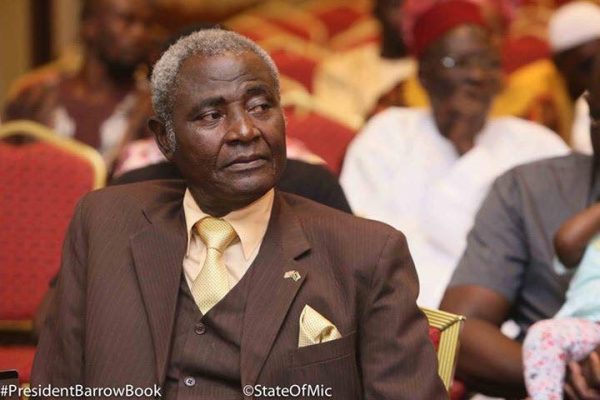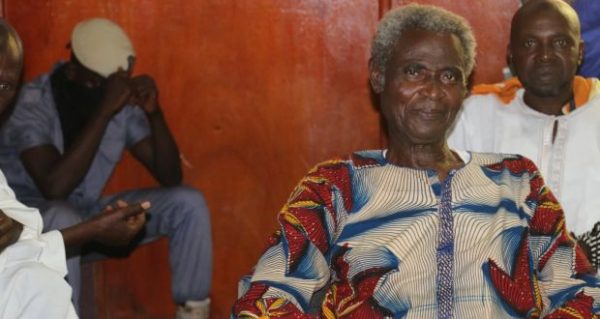
The news of the death of Uncle Femi Peters truly pains and angers me beyond measure. Femi should not have died now if there was no draconian Public Order Act and if both the former and current leaders had demonstrated the necessary responsibility and compassion.
Femi Peters was the first politician to be sent to jail for one year in 2010 charged under the Public Order Act for holding a political rally in Banjul without a permit to use a public address system. In the trial his defense lawyer Ousainou Darboe, head of UDP compared Femi to Nelson Mandela and condemned the Public Order Act as unconstitutional and colonial. Yet the court went ahead to incarcerate such a fine senior citizen to one year in Mile 2 prison, Africa’s Hell on Earth.
UDP did not just stop at that trial but they went further to challenge the constitutionality of the Public Order Act in the Supreme Court.
Fast forward to April 2016 when Femi and UDP leaders marched to demand the body of another martyr of the Public Order Act Solo Sandeng. Not only was Femi and fellow leaders physically assaulted by the paramilitary forces but he was further dumped in jail for many months while being subjected to a kangaroo trial. In July 2016 the court once again sent him to jail for 3 years for unlawful assembly.
Since January 2017, after many months in jail Femi and scores of Gambians were released along with Ousainou Darboe, we have been counting the number of deaths so far. From Solo Koroma to Lang Marong to Ebrima Ceesay and now Femi Peters!!! How many more will have to die before the Barrow Administration realizes that there is an urgent need for a major government health intervention program to subject all victims of torture to medial attention of the highest quality?
Over the past months I have personally met numerous Gambians who were arrested with Lawyer Darboe and Femi Peters yet they are still languishing in pain and misery with only little to no medical attention from the Government which is even selectively provided. Barrow himself was only able to meet victims of human rights violations on the very day the German president visited the Gambia in December 2017.
Clearly Femi’s life and the lives of many others could have been saved if the Government has seen the urgency of their situation and provided them with excellent medical attention simply because they were victims of torture perpetrated by the Government of the Gambia at one point.
Not only is the Government failing to take up the matter of victims more seriously, but even in this New Gambia with a new Supreme Court headed by Gambians of repute, it is utterly disappointing to have them go further to certify that colonial, obnoxious and draconian Public Order Act as constitutional. Even the UDP that took the matter to the court has remained mute over the issue as if they do not care.
Barrow had said in his Manifesto that within six months of taking power he would repeal all laws that infringe on human rights, democracy and popular participation. Yet here is the Public Order Act, which they listed in their Coalition MoU and Manifesto as one of the laws to be repealed still remains alive and kicking in our books. Indeed this is an insult and disrespect to Femi Peters, Lang Marong, Solo Koroma, Ebrima Ceesay, Solo Sandeng and many others.
To add insult to injury, Barrow has refused to even review and restructure the Police Intervention Unit or the paramilitary force that has been one of the foremost weapons of oppression against Gambians for the past 22 years. It was the paramilitary forces that shot dead 16 schoolchildren in 2000. One of the triggers of that event was because some paramilitary personnel raped a schoolgirl at the stadium. Yet Barrow decides to leave that institution in tact and continue to be manned by the same personnel as before.
But not only did Barrow leave the PIU in tact, but he also has left the NIA and Mile 2 prison among other terror institutions to operate as usual when it was in these institutions that these martyrs faced torture and all sorts of inhuman and degrading treatment. This is indeed an insult and a drawback on what Gambians decided on 1st December 2016.
Therefore it is with huge sadness, anger and disappointment at the Gambia Government of today that Femi Peters died. Many will die because until today this Government has not taken up the responsibility with urgency to address the plight of victims of human rights violations.
It will be shame indeed for the Gambia Government to mourn Femi Peters.
For the Gambia, Our Homeland!






Journalism is considered more important these days, it plays an important role as an informative bridge between governing bodies and general public, in absence of media general public cannot know about what kind of bills and acts are passed in the parliament, and what are their positive and negative effects in the society. If media person close their eyes the government officials will do what they want, so media plays a very important and impartial role between government activities and general public, so much so that it is said that the freedom of media is the guarantee of success for a government. Below mentioned are a few recent incidents in which media played a key role and established itself as the fourth pillar of democracy. For instance such world records include Gambia online newspapers, Delhi Rape Case, the Arap spring and most recently sexual abuse in all aspects of society among others.
However, we can unequivocally emphasised the need for the media to provide accurate, truthful and comprehensive account of events, act as a forum for exchange of comment and criticism, present and clarify goals and values of the society and make sure that it projects a representative picture of the constituent groups of the society. The Gambia population as audience of the media also reiterated the fact that society and public have a right to expect high standards of performance and as such intervention can be justified to secure public good.
The Media is regarded as a two-pronged weapon. A good and responsible media can lift the nation to dizzying heights by providing a strong support for its development. National pride and a bad or irresponsible media can cause chaos and disorder in the society. Democracy is a rule of the people through their elected representatives. The government thus formed is subservient to popular sovereignty. One of the hallmarks of a democratic system is the freedom of expression and the space that is provided to dissenting views and opinions expressed by different sections of society. For the democratic system to function to its full potential, the participation on the part of the general masses is imperative, which in turn requires dissemination of reliable information to the masses on various public issues. This is where the mass media come in. Unfortunately, Gambia media fraternity has not only fell sort of professionalism in their incomplete and poorly wriiten reports and articles but also does not live up to expectation by reporting the truth.
For instance, both the raped incident at the stadium and killing of 16 students are not accurately reported because no single investigatory journalism methods are employed to uncover the truth and hold those responsible to task. The lead is clear that GNG and PIU were equipped with identitical uniforms and were both deployed with different commands to handle the demos. The irony is both were armed and empowered by law to conduct policing duties. What methods did the media employ to draw wrong conclusions pointing fingers to a particular unit without proof. The same would be upheld for the raped allegation commission by a fellow from a local humanitarian volunteer who personified as a police officer. These matters are of significance that responsible journalism is required to unearth the truth and not report rumors.
The internet has actually revolutionised the media and made it possible to disseminate information and ideas in real time across the globe. These developments are feared to have posed threats to the democratic way of thinking and new issues in regards to expanding role of the media have also come on the fore. The media has become quite unwieldy, making it difficult for the government to act as a watch dog against the indiscretions committed by it. This however has made it even more imperative than before for the governments to make sure that the media does not cross the Rubicon, with all it accompanying negative fall-out.
Judged on the touchstone of the foregoing, the media landscape in the Gambia presents a very dismal picture. While it zealously tends to maintain and protect its freedom, it is not showing the sense of social responsibility that goes with the freedom of expression. The media, regrettably, like the political polarisation in the country, is also divided into anti-government, pro-government, and rightist groups with each entity trying to rub-in its own skewed and partisan views on national issues and even resorting to smear campaigns against their supposed rivals. Consequently, truth and social responsibility have become casualties of this rampant media culture. This culture can be seen on our national TV and Observer more often than not the later inappropriate programs forced our citizens alien themselves to foreign channels in Senegal. Unprofessional journalism especially in the judicial reporting parading innocent citizens on TV has contributed to many human rights violations and yet no media house has ever criticised those sad actions.
The worst picture of the media despite the challenges in the operating environment during the former regime, no single journalist or media house from the electronic to print media or online newspapers have had edge closer to reporting the massive corruption , force disappearances, murders, arson of their own media houses, election malpractice among other pertinent issues. This, I must conclude basically had to do with serious deficiancies in professional training in range areas of journalism. It is highly recommended that the Media Association take corrective action in this anormaly.
I’m happy that they can and and always been critical of other institutions but sadly they never recognised or accept criticism or look inward on a path to waging a war against their own fundamental incredible ‘diseases’.
Media and government have a complimentary role in regard to promoting the well being of the masses and strengthening state structure. They are also watch dogs against each other and therefore need to recognise and acknowledge each other’s role ungrudgingly.
We are in a democratisation process and the role of the media is sacrosanct in this process and they must engage the government to help shape the much needed democracy with the right reforms. God Bless the media fraternity and God Bless Gambia